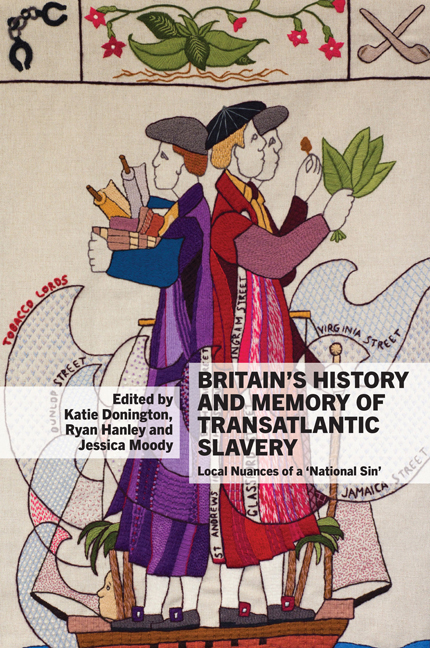Book contents
- Frontmatter
- Contents
- List of Illustrations
- Acknowledgements
- Contributors
- Introduction
- I Little Britain's History of Slavery
- II Little Britain's Memory of Slavery
- 6 Whose Memories? Edward Long and the Work of Re-Remembering
- 7 Liverpool's Local Tints: Drowning Memory and ‘Maritimising’ Slavery in a Seaport City
- 8 Local Roots/Global Routes: Slavery, Memory and Identity in Hackney
- 9 Multidirectional Memory, Many-Headed Hydras and Glasgow
- 10 Making Museum Narratives of Slavery and Anti-Slavery in Olney
- Afterword
- Selected Bibliography
- Index
- Plate section
6 - Whose Memories? Edward Long and the Work of Re-Remembering
from II - Little Britain's Memory of Slavery
- Frontmatter
- Contents
- List of Illustrations
- Acknowledgements
- Contributors
- Introduction
- I Little Britain's History of Slavery
- II Little Britain's Memory of Slavery
- 6 Whose Memories? Edward Long and the Work of Re-Remembering
- 7 Liverpool's Local Tints: Drowning Memory and ‘Maritimising’ Slavery in a Seaport City
- 8 Local Roots/Global Routes: Slavery, Memory and Identity in Hackney
- 9 Multidirectional Memory, Many-Headed Hydras and Glasgow
- 10 Making Museum Narratives of Slavery and Anti-Slavery in Olney
- Afterword
- Selected Bibliography
- Index
- Plate section
Summary
Introduction
In the picturesque West Sussex village of Slindon is buried Edward Long, one of the most vociferous and influential supporters of the slave trade and slavery. The name of William Wilberforce is branded on public memory; the part he played in the abolition of slavery and the slave trade is regularly revisited. But what of the slave owners who resisted abolition for so long and whose names are for the most part forgotten? Slavery has been a subject of political contestation for a very long time and as Toni Morrison has taught us, remembrance is central to that politics. In the work of re-remembering Britain's deep involvement in the slavery business, Long is an important figure to revisit.
‘In the struggle to shape the future,’ Vincent Brown writes in his book on the centrality of death to the world of Atlantic slavery, ‘the dead do not necessarily have the last word, but they always have a voice.’ The tombs and memorials that were constructed then to white ‘West Indians,’ as the colonists were called, whether in Britain or the Caribbean, were intended to impose a permanent memory. They were attempts, conscious or not, to face future struggles over the politics of truth. They were part of the war of representation over slavery: who was telling the truth as to the nature of that institution and the character of the African? Was it the pro-slavers or the abolitionists? The dead could play a part in that struggle too, the forms of commemoration were never innocent. This chapter focuses on Edward Long, the historian of Jamaica; a writer who denied the full humanity of enslaved men and women. Disavowal, knowing and not knowing, was central to his thinking and to the ways in which it was intended that he should be remembered.
His History of Jamaica. Or, General Survey of the Ancient and Modern State of That Island: with Reflections on its Situation, Settlements, Inhabitants, Climate, Products, Commerce, Laws, and Government was published in three volumes in 1774. It established itself immediately as the authoritative work on the island of Jamaica which, at that time, was the jewel in the crown of the British Empire, the most productive of the British West Indian sugar islands.
- Type
- Chapter
- Information
- Britain's History and Memory of Transatlantic SlaveryLocal Nuances of a 'National Sin', pp. 129 - 149Publisher: Liverpool University PressPrint publication year: 2016



